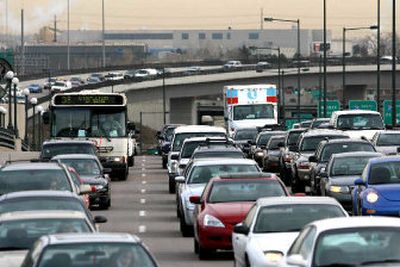Beating that empty feeling

NEW YORK — As the price of gasoline continues to soar, Americans are finding a variety of ways to lower their fuel costs. Some are joining car pools or walking to work, others are adopting more frugal driving habits. A few are even swapping their SUVs for more fuel-efficient cars.
With the price of gasoline exceeding $3 a gallon in some places, “families already are starting to feel the pinch,” said Kateri Callahan, president of the nonprofit Alliance to Save Energy in Washington, D.C. And prices are likely to go higher during the traditionally heavy summer driving season, she warned.
Her advice: If you’re in the market for a new car, buy the most fuel-efficient model you can afford. If you’re stuck with what’s in the driveway, make sure it’s tuned up and that you drive in a manner that will get you the best fuel efficiency.
For Mark Remington, of Allegan, Mich., cutting gas costs meant trading his Toyota SUV for a new Toyota Camry sedan.
“With the SUV, I would pull up to the pump and pay $60 or more to fill it up,” said Remington, who operates an insurance agency. “With the trade, I’ve gone from 20 miles to the gallon to 40 miles to the gallon.”
The downside, he acknowledges, will be getting along without four-wheel drive capability of the SUV in Michigan’s snowy winters. But, he said, “I believe the savings (in gas) outweigh that.”
The high price of gas — and environmental concerns — motivated Ryan Sharp to start commuting on foot. About a year ago, Sharp found a new job as a computer systems analyst at a company a mile away from his home in Seattle and started walking to and from work, rain or shine.
“My commute has turned into exercise,” he said. The benefits are that he’s lost 13 pounds and is in a better mood.
“In the morning, my walk wakes me up and gets me ready to go for the day,” Sharp said. “My walk home allows me to get the office out of my head.”
Many communities around the nation have programs aimed at getting Americans out of their cars and into mass transit.
One of the more successful is Atlanta’s Clean Air Campaign, which offers commuters financial rewards if they join car pools or change to mass transit, walking or biking to get to work. The campaign’s “cash for commuters” rewards participants $3 a day, up to $180 over a three-month period. A subsidized van program also is available.
Ellen Macht, executive director of the Atlanta campaign, said the cash rewards program drew some 4,300 participants last year — many of them after summer hurricanes damaged Gulf Coast oil facilities and sent gas prices up sharply.
“We’re seeing additional increases” with this year’s fuel price rise, she said. She added, however, that “a lot of consumers seem to be more jaded about prices.”
Among those who signed up last fall was Chris Sears, who works with the SunTrust Community Development Corp. in Atlanta.
“I had a 20 mile, one-way commute, and after (Hurricane) Katrina, the price of gas got out of control,” he said. “So when I heard about the clean air campaign, I was interested.”
Sears found a co-worker with a similar work schedule, and they decided to give car pooling a try.
“It does take some sacrifice on both sides — you have to be considerate of each other’s scheduling needs, for example,” he said.
But the reward — in addition to $3 a day — has been that Sears has to buy gas for his car every two weeks instead of every week, “and at today’s prices that’s a substantial saving,” he said.
Charlie Garlow, of Silver Spring, Md., is a committed environmentalist who is personally and professionally concerned about gases that contribute to global warming, including those from fossil fuels like gasoline.
An attorney with the U.S. Environmental Protection Agency in Washington, D.C., he decided there was no reason to drive to work when buses and trains were available. So he walks — or, sometimes, jogs — to a bus stop every morning, then transfers to the subway.
“It gives me time to read my book,” he said. “And I arrive at the office feeling refreshed.”
Garlow said he’s noticed that the bus has been getting more crowded in recent days, “so maybe gas prices are motivating more people to take mass transit,” he said.
Garlow hasn’t abandoned driving altogether, but he has abandoned gasoline — on weekends he drives an electric-powered pickup truck.